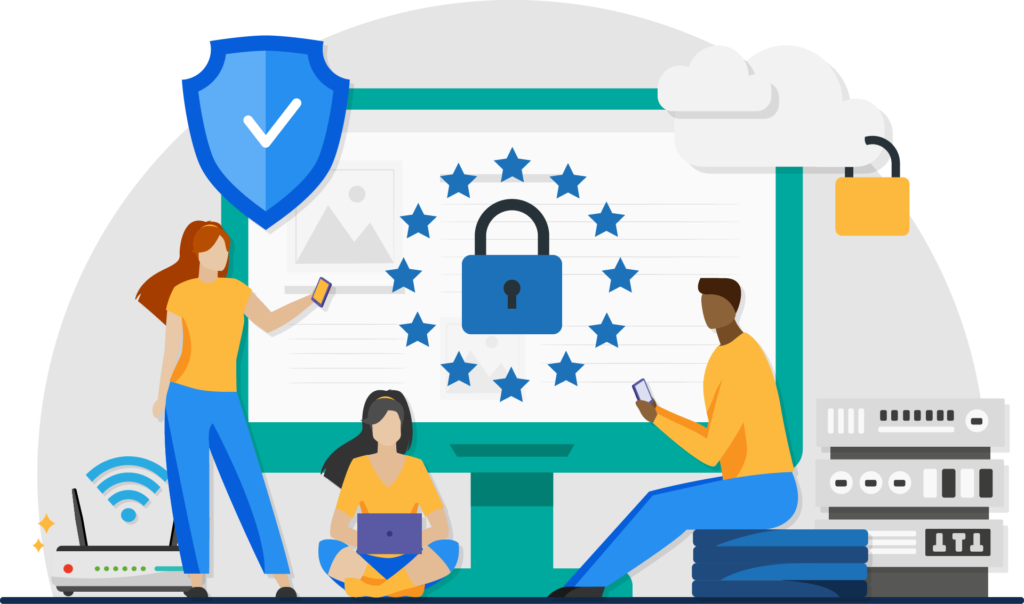What is VPN and why do you need one?

What is VPN?
VPN stands for Virtual Private Network. It is a service used to keep the internet connection private and secure. When you are surfing the internet, it is as if you are on a large commercial avenue, and each website you visit is like a store on this avenue.
Like on the street, some people can watch you and see which stores (websites) you go to, what you do, etc. When using a VPN, it is as if you were using a tunnel straight from your home to the desired store (website), and no one could see what you did. That is the purpose of a it, to make you anonymous online.
A VPN (virtual private network) creates a secure connection between your device and the Internet and is one of the best ways to ensure privacy, security, and freedom online.
In short, the VPN service does two things: it encrypts your data and changes your IP address. Let’s talk a little more about each one:
- Encryption: it is the process of encrypting your data. Encrypting a message is converting normal text (like the one you’re reading) into unintelligible code. The recipient needs to know the rules for decoding the message and restoring it to readable text. That’s what a VPN does, and it encrypts your data so that no hacker can decipher the data that you traffic on the internet.
- Change the IP address: IP address is a unique numeric code for your Internet connection. Through a VPN, you change your IP address because you use the VPN server’s IP, which guarantees privacy and anonymity.
Therefore, a VPN prevents third parties from seeing your personal information, hides your identity, prevents advertiser activity, and keeps you safe on public Wi-Fi networks.
In addition to security, you can access streaming sites with region restrictions and unlock Netflix and other services. For example, being in Brazil and accessing Netflix, you only have access to Brazil’s library.Through a VPN, on a server in the United States, you will access the Netflix library in that country and watch content not available in Brazil.
There are free VPNs, but care must be taken when using them because, in addition to not offering all the features of a good VPN, they can also steal your data and sell them.
Paid VPNs offer the full potential in terms of features and security. Besides, most offer a trial period, with a refund guarantee of up to 30 days without risk, just contact customer support.
What does it do?
A VPN encrypts your data, which prevents intruders from discovering what you do on the internet, and changes your IP (Internet Protocol), which prevents you from being identified on the internet.
Thus, in addition to protecting you, it allows you to unlock sites not available in your region, download torrent files safely, and protect your privacy against any attacker, even Google and other sites that track browsing habits to send advertisements.
VPN does this through two main functions: encryption and IP hiding.
Encryption
VPN services use encryption, the process of encrypting your data, to generate a secure tunnel between the device (smartphone, laptop, etc.) and a remote VPN server. Your data, encrypted, goes through this tunnel and forward to the requested website or application in a safe and protected form from intruders.
This encrypted tunnel prevents Internet service providers (ISPs), authorities, and hackers from spying on your online activity. If a third party tries to monitor your connection, all you will see is a sequence of unintelligible letters and numbers.
Hide your IP
An IP (Internet Protocol) address is the unique identification number given to each connection to the Internet, which allows you to identify your physical location and everything you do online.
A VPN can hide your IP address from the sites you visit by making the sites see the VPN server’s IP address through which your connection is being routed instead of your real IP address.
This procedure also allows you to hide your real location. Most of the providers offer servers located around the world, and the location of the server you connect to determines where websites and applications perceive your physical location.
Why do I need one?
To protect your privacy, surf anonymously and access blocked content. Your Internet service provider (ISP) can see the websites you visit, collect and store this information and even provide it to governments.
When using public Wi-Fi, such as in restaurants, hotels, shopping centers, and airports, your data can be stolen by hackers. Likewise, unprotected Wi-Fi networks at home are also a risk.
To protect your data, a VPN will encrypt Internet traffic, making data theft much more difficult.
Another good reason to have a VPN is to unlock streaming services.
Generally, streaming services – such as Netflix, Hulu, or BBC iPlayer – have different content, depending on the user’s physical location. For example, Netflix in the U.S. has more content than in any other country, and you can only access that library if you access Netflix from a computer in the U.S.
Since streaming services determine your physical location using your IP address, it masks your real IP address by a VPN server in another country. If you select a server in the USA, the streaming site will identify that you are located in the USA and release the content.
It is important to note that VPN allows access to restricted content. To access streaming services, you will need to subscribe to these services.
How to choose one?
First of all, you should be very clear about the main use of the VPN. If you travel to China or another country that controls internet use, the best is to choose a VPN with strong encryption. If you intend to use more for streaming or torrent, you should select one with fast speed, reliable access, and many servers worldwide.
It is also essential to check the applications available for each type of device and the operating system you use.
Are free VPNs secure?
Some VPNs are free, but care must be taken when using them because, in addition to not offering all the features of a good VPN, they can also steal your data and sell them.
Paid VPNs offer the full potential in terms of features and security. Also, most offer a trial period, with a refund guarantee of up to 30 days without risk, just contact customer support.
Is a it Legal?
The use of VPN is legal in almost every country in the world. In Belarus, Iraq, North Korea, and Turkmenistan, it is illegal to use it in China, Russia, Iran, Turkey, Oman, and the United Arab Emirates; the VPN is restricted to use.
How to start using it?
After contracting the service, you can download a custom application directly from your chosen service provider. Most VPN providers offer custom apps for Windows, macOS, Android, and iOS, and some also offer specific apps for routers and streaming devices like the Amazon Fire TV Stick.
How do I unlock sites using a VPN?
What are VPN protocols?
VPN protocols are rules and processes that the VPN client follows to maintain a secure connection between your device and the VPN server. The VPN protocol determines how this secure connection will be formed, and, depending on the protocol in use, the VPN may have different speeds, resources, or even vulnerabilities.
The most common protocols are:
OpenVPN: It is open-source, with high security and operational security on almost all VPN compatible devices. This is the most popular protocol used by most VPN providers globally and offers the right balance between speed and safety.
IKEv2 / IPsec: IKEv2, used in conjunction with IPsec, IKEv2 is a newer protocol that is very secure, fast, and easily handles network changes, making it the ideal mobile protocol devices that frequently switch between Wi-Fi and mobile data.
WireGuard: is the newest protocol. It aims to be faster, safer, and easier to implement than the other protocols.
SoftEther: SoftEther provides breakneck connection speeds and good security. However, it has some standard configuration vulnerabilities and is compatible with few vendors.
L2TP / IPsec: this is a very outdated protocol and has some security flaws.
SSTP: It is a closed-source protocol owned by Microsoft and is based on SSL 3.0, which is vulnerable to a specific MITM attack called Poodle.
PPTP: This protocol is outdated and very insecure and can be invaded in a matter of minutes.
Is it worth having it?
For sure, because a good VPN is essential for security, privacy, and freedom, protecting all your devices.

